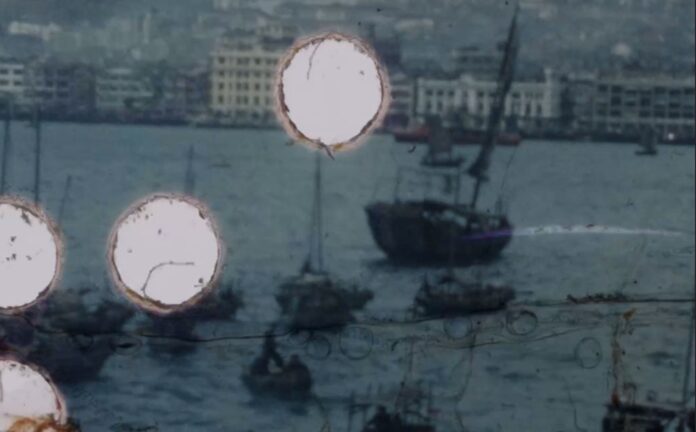Several years ago, Courtney Stephens was working for the resurgent Terrence Malick, who’d just made The Tree of Life, when she got a potentially serious medical diagnosis—particularly so for someone then just in her late 20s. So she quit that relatively-mainstream film industry gig and embarked on more personal projects. Mobility as well as mortality was on her mind, notions that led eventually to Terra Femme, which she brings to SF Cinematheque (at Gray Area in the Mission) on Wed/15. The 62-minute documentary/personal essay, which she narrates in person for live audiences, is entirely comprised of archival footage shot in the early decades of the medium, by (or at least depicting) women who were traveling the world.
This was, by and large, a new thing: Before the 20th century, men did the “exploring,” and women tagged along only as adjuncts, whether colonial wives, relatives of traders, missionaries under male supervision, etc. It was considered not just unseemly but near-impossible for women to travel “unchaperoned,” let alone simply for pleasure. But eventually technology made traversing great distances easier, then more affordable, though some of the subjects we glimpse here—like a Mrs. Dixon of Philadelphia, who booked charter cruises to the Arctic Circle for her cavorting friends nearly a century ago—clearly benefitted from considerable personal wealth.

Others we see in locations from Peking to the prairie include a globetrotting couple from Yonkers who showed their travelogues in private “cinema clubs;” Aloha Wanderwell Baker, “The World’s Most Traveled Girl,” whom the auto industry hired to promote car driving (and ownership) for women; plus archeologists, anthropologists, a women’s climbing club, and other happy invaders of what had previously been male terrain, whether geographic, hobbyist or professional. We also watch clips of ordinary street life in various towns shot by a Pullman porter. Those reels captured the emergence of a Black middle class in an era when travel for African-Americans required careful consulting of the “Green Book,” which mapped out places it was safe for non-whites to eat, sleep, and otherwise exist.
Throughout this compendium of antique roaming images, Redwood City native Stephens muses on the changing roles of hitherto subservient groups in an evolving culture, as well as the values and biases that keep them in “their place.” She also ponders “the female gaze,” the nature and meaning of images themselves, the histories buried beneath them. The particular images Terra Femme excavates are both revealing and enigmatic in retrospect, the latter quality deriving largely from the fact that we generally know so little about the people who “took” them. Those amateur photographer-travelers gained a kind of immortality that simultaneously stokes mystery. For more info on the Cinematheque program, go here.
Travel is also broadening—not necessarily in a good way—for women in two intriguingly offbeat new narrative features. In Mariana Bastos’ Brazilian Raquel 1:1 (which arrives on major US streaming platforms Tue/14), Valentina Herszage’s titular teen has been forced to relocate with her widowed father (Emilio de Mello) to his hometown, their financial prospects having dried up elsewhere. Raquel is a Christian, so she’s open to being recruited by peers in a local youth ministry; their queen bee, Ana Helena (Priscila Bittencourt), is the daughter of its parent church’s theatrically flamboyant woman pastor.
But after a mysterious experience (never fully explained to us) during an excursion to a swimming hole, Raquel begins questioning patriarchal concepts and other sticking points in the Bible, as well as the rather heavy-handed authority of Ana Helena and her mum. Needless to say, those ladies do not take well to being “challenged.” 1:1 turns into a tale of latterday witch-hunting, as these holy hypocrites disguise their bullying and ostracizing of a newcomer as “God’s will.” Ultimately a bit pretentious and unsatisfying in its juggling of social criticism and possibly-supernatural thriller elements, this is nonetheless a potent drama about the kind of skewed religious faith we see at work more every day: The type that is used more to punish supposed apostates than to “save,” and which for many has made the term “evangelical Christian conservative” pretty much synonymous with “assh*le.”
In Pete Ohs’ Jethica, available on streaming platform Fandor as of Tue/14, travel is likewise involuntary. Elena (Callie Hernandez) is surprised to run into old friend Jessica (Ashley Denise Robinson), who says she’s just passing through, but agrees to stop by her former high school classmates’ desert RV home. It doesn’t take long for Jessica to spill the reason for her “road trip”: She has a stalker, one Kevin (Will Madden), who has successfully pursued her from California to Santa Fe. He soon turns up here, too, pacing and muttering obsessively outside in a very annoying fashion. There is a simple if fantastical reason why he’s so hard to get rid of: Kevin is not, well, alive.
Coming hot on the heels of The Civil Dead, another drolly comedic US independent feature about acquaintances who refuse to act like the corpses they are, the 72-minute Jethica is a bit thin. It’s basically an extended anecdote that might have been told just as well in one-third the runtime, and is basically a “worst date ever” version of a memorable short from 2008, The Horribly Slow Murderer With the Extremely Inefficient Weapon. But it’s also clever, accomplished, and has a distinct sensibility of its own.
Help us save local journalism!
Every tax-deductible donation helps us grow to cover the issues that mean the most to our community. Become a 48 Hills Hero and support the only daily progressive news source in the Bay Area.
Also arriving this week are two new documentaries that are portraits of the male artist. Alysa Nahmia’s Art & Krimes by Krimes is primarily a portrait stretching over several years of Jesse Krimes, who frittered away an art school scholarship while being a teenage “trainwreck,” eventually landing in prison (a second time) for dealing coke. Upon his release, at risk of severe “third strike” sentencing for any additional offense, he’s determined to make it in the art world—and indeed had surreptitiously worked on various projects (including a massive mural) while in the hoosegow. He may be an unusual, Foucault-quoting kind of ex-con, but that doesn’t greatly heighten the ease of making a living as a conceptual artist.
The director, her subject, and fellow formerly-incarcerated artists Russell Craig, Jared Owens, and Gilberto Rivera will be present for Q&A’s at three area screenings this week: Wed/15 at Stanford’s Anderson Collection in Palo Alto, Thurs/16 at SF’s Roxie Theater, and Fri/17 at San Quentin—though you probably won’t be getting on the guest list for that last one.
If paintings and objets made by current or released inmates might constitute one kind of “outsider art,” an entirely different sort was made by the late French director whose life and work is considered in Dima Ballin and Kat Ellinger’s Orchestrator of Storms: The Fantastique World of Jean Rollin. Though a contemporary of such European cult genre figures as Mario Bava, Jose Larraz, and Jess Franco, Rollin was even farther out on the fringe, and considered even more marginal for working in a native land that until quite recently had almost no demand or respect for horror cinema. (That tide didn’t really turn until Alexandre Aja’s Haute Tension, 20 years ago.) Nor did most actual horror fans tend to like his movies: Often near-plotless, they get described here as being more about “dreams and memories” than the usual scaremongering, their ambiance “wonderfully strange and poetical,” the primary aim to “wrench beauty out of the grotesque.” Or as he put it, “The imagery in my films is certainly much more important than the story itself…and the images are surrealist visions.”
Nonetheless, so long as he provided a minimum of exploitable elements—notably blood and nudity—Rollin found funding for a singular series of low-budget features vaguely in a “lesbian vampire” mode from 1968’s Le viol du vampire through 1975’s Lips of Blood. Then hardcore porn was legalized in France, pretty much wiping out the market for softcore titillation. So Rollin’s fortunes went from scrappy to desperate, including some presumably reluctant work on actual porn with titles like Folies Anales and Disco Sex. Still, he got an occasional break, and lived long enough to enjoy renewed (or perhaps first-ever) critical appreciation. That in turn allowed him to make several summary-statement features before declining health claimed his life in 2010.
At nearly two full hours, Orchestrator of Storms may be more than the casually curious need as introduction. But with copious clips, plus interviews both archival and new (including with his frequent onscreen “muse” Brigitte Lahaie), it will thrill fans of this odd, sometimes tedious, sometimes hypnotic screen ouevre. It premieres on streaming service Arrow this Tue/14, along with a selection of Rollin titles running a full gamut from very good (Living Dead Girl, Two Orphan Vampires) to “interesting” (Lost in New York, Dracula’s Fiancee) to unwatchable (Zombie Lake, a movie he completed after even the normally undiscriminating Franco had abandoned it).





